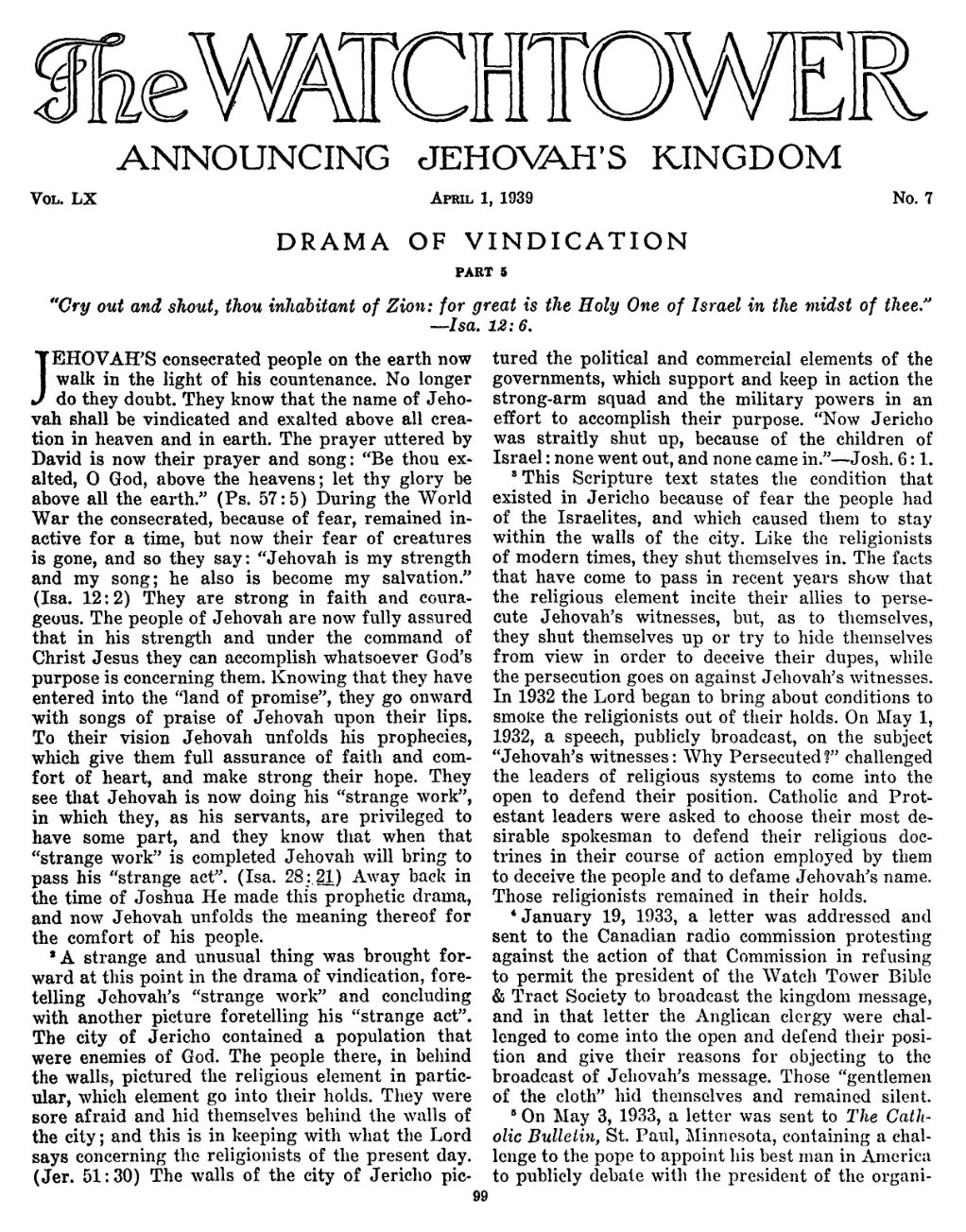She WAICHTOW
ANNOUNCING JEHOVAH'S KINGDOM
Vou. LX
Aprit 1, 1939
No. 7
DRAMA OF VINDICATION
PART 5
“Cry out and shout, thou inhabitant of Zion: for great is the Holy One of Israel in the midst of thee.”
—Isa. 12:6.
EHOVAH’S consecrated people on the earth now
walk in the light of his countenance. No longer
do they doubt. They know that the name of Jeho-
vah shall be vindicated and exalted above all crea-
tion in heaven and in earth. The prayer uttered by
David is now their prayer and song: “Be thou ex-
alted, O God, above the heavens; let thy glory be
above all the earth.” (Ps. 57:5) During the World
War the consecrated, because of fear, remained in-
active for a time, but now their fear of creatures
is gone, and so they say: “Jehovah is my strength
and my song; he also is become my salvation.”
(Isa. 12:2) They are strong in faith and coura-
geous. The people of Jehovah are now fully assured
that in his strength and under the command of
Christ Jesus they can accomplish whatsoever God’s
purpose is concerning them. Knowing that they have
entered into the “land of promise”, they go onward
with songs of praise of Jehovah upon their lips.
To their vision Jehovah unfolds his prophecies,
which give them full assurance of faith and com-
fort of heart, and make strong their hope. They
see that Jehovah is now doing his “strange work”,
in which they, as his servants, are privileged to
have some part, and they know that when that
“strange work” is completed Jehovah will bring to
pass his “strange act”. (Isa. 28:21) Away back in
the time of Joshua He made this prophetic drama,
and now Jehovah unfolds the meaning thereof for
the comfort of his people.
- A strange and unusual thing was brought for-
ward at this point in the drama of vindication, fore- telling Jehovah’s “strange work” and concluding with another picture foretelling his “strange act”. The city of Jericho contained a population that were enemies of God. The people there, in behind the walls, pictured the religious element in partic- ular, which element go into their holds. They were sore afraid and hid themselves behind the walls of the city; and this is in keeping with what the Lord says concerning the religionists of the present day. (Jer. 51:30) The walls of the city of Jericho pic- 99 tured the political and commercial elements of the governments, which support and keep in action the strong-arm squad and the military powers in an effort to accomplish their purpose. “Now Jericho was straitly shut up, because of the children of Israel: none went out, and none came in.”—Josh. 6: 1.
- This Scripture text states the condition that
existed in Jericho because of fear the people had of the Israelites, and which caused them to stay within the walls of the city. Like the religionists of modern times, they shut themselves in. The facts that have come to pass in recent years show that the religious element incite their allies to perse- cute Jehovah’s witnesses, but, as to themselves, they shut themselves up or try to hide themselves from view in order to deceive their dupes, while the persecution goes on against Jehovah’s witnesses. In 1932 the Lord began to bring about conditions to smoke the religionists out of their holds. On May 1, 1932, a speech, publicly broadcast, on the subject “Jehovah’s witnesses: Why Persecuted?” challenged the leaders of religious systems to come into the open to defend their position. Catholic and Prot- estant leaders were asked to choose their most de- sirable spokesman to defend their religious doc- trines in their course of action employed by them to deceive the people and to defame Jehovah’s name. Those religionists remained in their holds. ‘January 19, 1933, a letter was addressed and sent to the Canadian radio commission protesting against the action of that Commission in refusing to permit the president of the Watch Tower Bible & Tract Society to broadcast the kingdom message, and in that letter the Anglican clergy were chal- lenged to come into the open and defend their posi- tion and give their reasons for objecting to the broadcast of Jehovah’s message. Those “gentlemen of the cloth” hid themselves and remained silent. ®QOn May 3, 1933, a letter was sent to The Cath- olic Bulletin, St. Paul, Minnesota, containing a chal- lenge to the pope to appoint his best man in America to publicly debate with the president of the organi-
